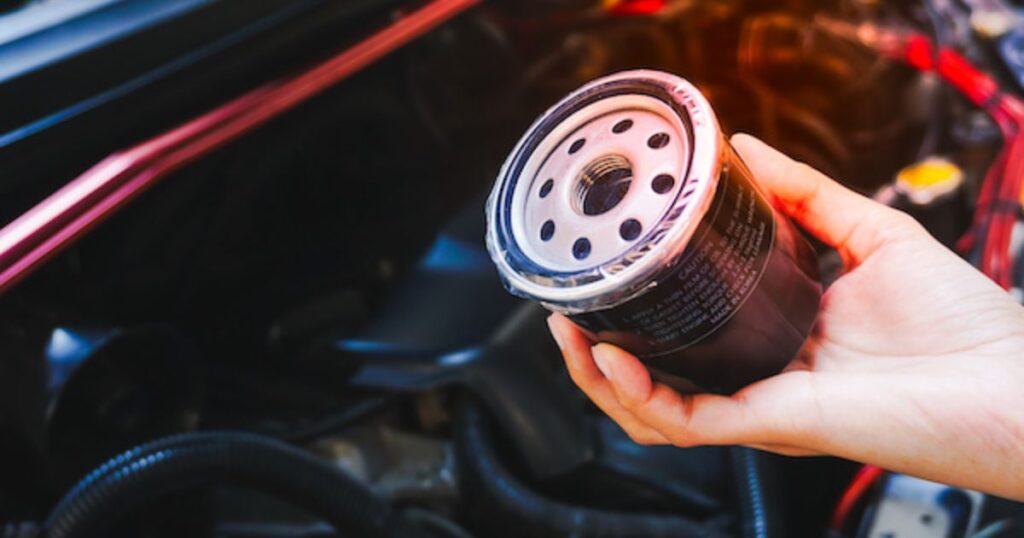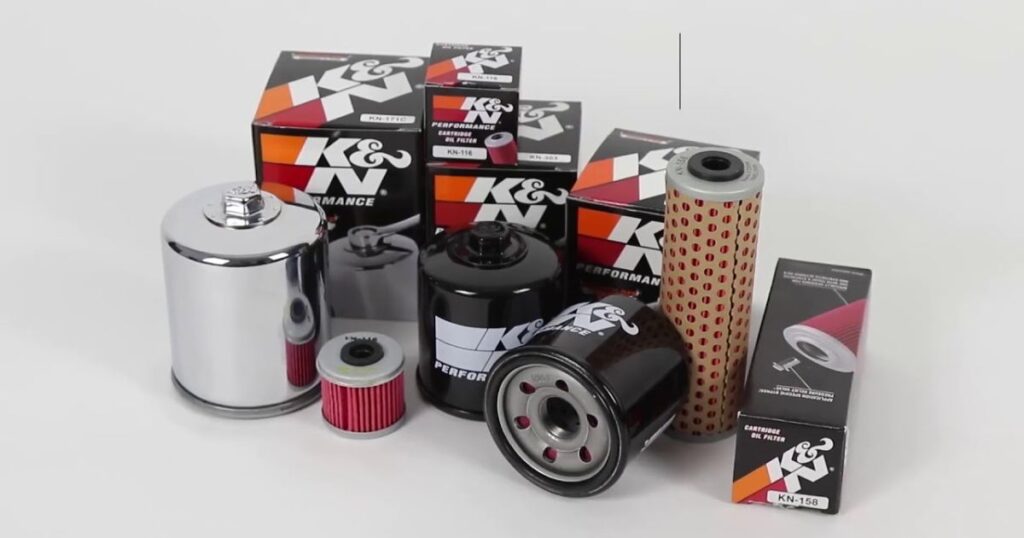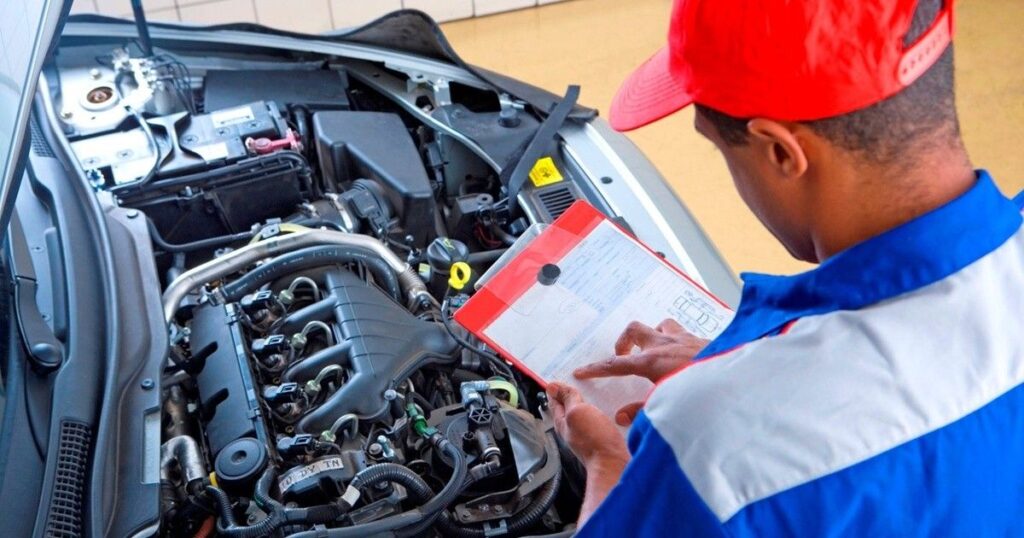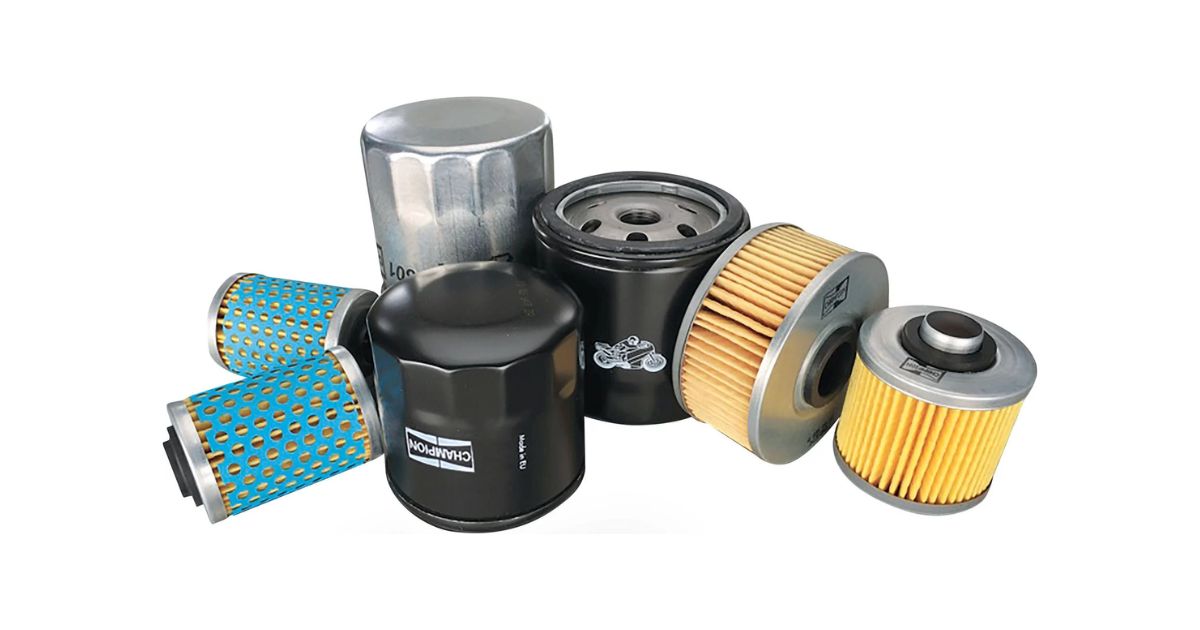An oil filter is a vital component in a car’s engine system, designed to remove impurities and contaminants from the engine oil. It ensures smooth operation by preventing debris from causing damage, with two common types being spin-on filters and cartridge filters.
Choosing the right oil filter is crucial for your vehicle’s health. Wondering what type of oil filter do I need? Start by checking your car’s manual. It usually specifies the recommended filter. Consider your driving habits if you tow or drive in extreme opt for a high-performance filter. Don’t forget to match the filter’s compatibility with your engine type.
To determine the right oil filter for your car consult the owner’s manual which specifies the correct type and size. It’s crucial to match the filter with your engine’s requirements to ensure optimal performance. Opt for a trusted brand to guarantee the filter’s quality and reliability for your vehicle.
Design and Fabrication Integrity
Design and Fabrication Integrity is a critical aspect in various industries ensuring that products are engineered and manufactured to meet specified standards and perform reliably throughout their lifecycle.
This encompasses a thorough examination of the design process material selection and manufacturing techniques to guarantee the structural and functional integrity of the final product. It involves meticulous attention to detail adherence to industry regulations, and the use of advanced technologies to identify and mitigate potential defects.
In the automotive industry Design and Fabrication Integrity is particularly crucial when considering components like the oil filter. The oil filter plays a vital role in maintaining the health of an internal combustion engine by trapping contaminants and preventing them from circulating through the system.
The Type of Oil Filter chosen for a vehicle can significantly impact its overall performance and longevity. Different types of oil filters such as mechanical cartridges and magnetic filters cater to specific engine requirements. Selecting the appropriate type ensures optimal filtration efficiency and protects the engine from potential damage caused by impurities in the oil.
Regular maintenance, including oil and filter changes is essential for preserving the integrity of an engine. Neglecting to use the right type of Oil Filter or adhering to recommended replacement intervals can compromise the filtration process and expose the engine to increased wear and tear.
Therefore a comprehensive approach to Design and Fabrication Integrity extends to the selection and maintenance of individual components such as oil filters, contributing to the overall reliability and performance of the machinery in which they are employed.
Oil Filter Construction
Oil filter construction involves a cylindrical housing filter media and an anti-drain back valve. The housing encases the filter media responsible for trapping contaminants and ensuring clean oil circulates the engine.
Different engines may use distinct types of oil filters highlighting the importance of selecting the appropriate Type of Oil Filter for optimal performance and longevity.
Oil Filter Selection
Choosing the right oil filter is crucial for maintaining your vehicle’s engine health. The type of oil filter you select directly impacts its efficiency in trapping contaminants and ensuring proper lubrication.
When considering oil filters, always pay attention to the Type of Oil Filter to ensure compatibility with your engine’s specifications for optimal performance and longevity.
Oil Filter Test Methods
Oil filter test methods are crucial for evaluating the efficiency and performance of filters in removing impurities from engine oil.
Various techniques such as pressure drop measurements and particle count analysis are employed to assess the filtration capabilities. These tests help determine the effectiveness of different types of oil filters in maintaining optimal engine health and performance.
Dirt-Holding Capacity
Dirt-holding capacity refers to the ability of an oil filter to retain and trap impurities such as dirt and contaminants within its filtering media.
This crucial feature ensures efficient engine protection by preventing harmful particles from circulating in the oil system. When choosing a type of oil filter assessing its dirt-holding capacity is essential for maintaining optimal engine performance and longevity.
Pressure-Flow Profile
A Pressure-Flow Profile is a crucial aspect of understanding fluid dynamics in various systems such as hydraulic or lubrication systems. It illustrates how pressure changes with the flow of fluids offering insights into system performance. When considering the efficiency of these systems the type of oil filter employed plays a pivotal role in maintaining optimal pressure levels and ensuring smooth flow.
How Often Should You Change Your Oil Filter?

Regularly changing your oil filter is essential for maintaining the health of your vehicle’s engine. Experts recommend replacing the oil filter every time you change your engine oil which is typically every 3,000 to 5,000 miles.
This interval may vary depending on your vehicle’s make and model as well as the type of driving conditions you typically encounter. A clogged or dirty oil filter can compromise the efficiency of your engine by allowing contaminants to circulate potentially leading to increased wear and tear.
When considering the frequency of oil filter changes it’s crucial to factor in the type of oil filter you are using. There are different types of oil filters available in the market including standard synthetic, and high-efficiency filters. Each type has its own lifespan and filtration capabilities.
Synthetic and high-efficiency filters often have a longer service life compared to standard filters providing improved protection for your engine. Choosing the right type of oil filter for your vehicle and Adhering to the manufacturer’s recommendations can contribute to optimal engine performance and longevity.
Changing your oil filter regularly is a vital aspect of routine vehicle maintenance. The recommended interval is typically aligned with the frequency of oil changes which is around every 3,000 to 5,000 miles.
However, it’s important to consider the type of oil filter you are using as different filters have varying lifespans and filtration capabilities. By staying proactive in oil filter replacement you help ensure that your engine operates smoothly and remains protected against potential contaminants.
Is a Premium, High-Capture Efficiency Oil Filter Right for You?
If you’re wondering whether a premium high-capture efficiency oil filter is the right choice for your vehicle it’s essential to understand the benefits it offers. These filters are designed to trap smaller particles and contaminants providing superior filtration compared to standard filters.
The increased capture efficiency ensures that the engine receives cleaner oil which in turn helps maintain optimal performance and prolongs the lifespan of your vehicle. If you prioritize engine health and want to invest in long-term maintenance a premium high-capture efficiency oil filter could be the ideal choice.
When considering the type of oil filter to use it’s crucial to recognize the various options available in the market. The type of oil filter you choose can significantly impact your engine’s performance and longevity. Premium filters often feature advanced materials and technology enhancing their ability to trap contaminants effectively.
Before making a decision consider your vehicle’s requirements driving conditions and maintenance preferences. Investing in a high-quality oil filter can be a wise decision for those looking to optimize their engine’s protection and ensure smooth operation.
Deciding whether a premium high-capture efficiency oil filter is right for you depends on your priorities and the specific needs of your vehicle. If you value superior filtration and want to safeguard your engine against contaminants especially in challenging driving conditions opting for a premium filter is a wise choice.
Keep in mind the type of oil filter you select plays a crucial role in maintaining your engine’s health so choose one that aligns with your vehicle’s requirements for optimal performance and longevity.
A Note about Oil Filter Mounts
| Step | Content |
| 1 | Introduction |
| Begin with a brief overview of the importance of oil filter mounts in automotive systems. | |
| 2 | Purpose of Oil Filter Mounts |
| Explain how oil filter mounts securely hold the oil filter in place and ensure proper function. | |
| 3 | Materials Used |
| List the common materials used in manufacturing oil filter mounts emphasizing durability. | |
| 4 | Design Considerations |
| Discuss key design factors such as compatibility with different engines and ease of installation. | |
| 5 | Importance of Proper Installation |
| Emphasize the significance of correct installation for preventing oil leaks and ensuring efficiency. | |
| 6 | Maintenance Tips |
| Provide tips on regular inspection and maintenance to prolong the life of oil filter mounts. | |
| 7 | Compatibility with Filters |
| Highlight the importance of selecting oil filters that match the specifications of the mounts. | |
| 8 | Conclusion |
| Summarize the key points and stress the role of oil filter mounts in maintaining engine health. |
Expert Tips on Choosing the Right Engine Oil Filter for Your Car

Choosing the right engine oil filter is crucial for maintaining the health and longevity of your car’s engine. One expert tip to consider is identifying the correct type of oil filter that matches your vehicle’s specifications.
The type of oil filter you choose depends on factors such as your car’s make, model, and engine requirements. It’s essential to consult your vehicle’s owner’s manual or seek advice from a professional mechanic to determine the suitable type of oil filter for optimal engine performance.
When selecting an oil filter another key tip is to prioritize quality over cost. Investing in a high-quality oil filter may cost a bit more initially but it can significantly contribute to the overall well-being of your engine.
Quality filters efficiently trap and remove contaminants preventing them from circulating through the engine and causing damage. By selecting a reputable brand and the right type of oil filter you ensure that your engine receives the best protection against harmful particles, ultimately enhancing its reliability and extending its lifespan.
Regular maintenance is essential and changing the oil filter at recommended intervals is a fundamental aspect of it. A general guideline is to replace the oil filter every time you change the engine oil. This practice ensures that your engine continues to run smoothly by keeping the oil clean and free from impurities.
Taking the time to follow these expert tips including selecting the appropriate type of oil filter will contribute to the overall health and efficiency of your vehicle’s engine, saving you from potentially costly repairs in the long run.
When Should I Change My Engine Oil Filter?
- Refer to the Owner’s Manual: Consult your vehicle’s owner’s manual to determine the recommended interval for changing the engine oil filter. Manufacturers often provide specific guidelines based on your car’s make and model.
- Regular Maintenance Schedule: Establish a routine maintenance schedule for changing both the engine oil and filter. This ensures consistent care and helps prevent the accumulation of harmful contaminants in the engine.
- Check Oil Change Intervals: If you drive under severe conditions, such as frequent short trips, towing, or extreme temperatures consider changing the oil and filter more frequently than the standard recommendation.
- Inspect for Contaminants: Regularly inspect the oil filter for visible contaminants. If you notice any signs of metal particles sludge or a dark gritty appearance it may indicate that the filter is reaching its limit and needs replacement.
- Change with Every Oil Change: The general rule of thumb is to change the oil filter every time you change the engine oil. This practice ensures that both components work optimally together enhancing overall engine performance.
- Use Quality Filters: When replacing the oil filter opt for a high-quality filter that meets or exceeds the specifications recommended by your vehicle’s manufacturer. Quality filters are more effective in trapping contaminants and maintaining oil cleanliness.
- Keep Records: Maintain a record of your oil and filter changes noting the mileage and date of each service. This documentation helps track your vehicle’s maintenance history and serves as a reminder for future oil and filter replacements.
Do Different Types of Oil Need a Specific Car Oil Filter?

The type of oil filter needed for a car is influenced by the type of oil used in the engine. Different types of engine oil have varying compositions and additives affecting their viscosity and overall performance.
Conventional oil synthetic oil, and blends each have unique characteristics, and using the appropriate oil filter is crucial to ensure optimal filtration and engine protection.
The compatibility between oil and oil filters lies in their ability to work together efficiently. Certain oil filters are designed to handle the specific properties of synthetic oils, while others may be better suited for conventional oils.
The type of oil filter needed depends on the engine’s requirements and the oil used. Vehicle owners need to consult their car’s manual or seek guidance from a professional to determine the appropriate oil filter for their specific type of oil.
Selecting the right type of oil filter is paramount to maintaining the health and longevity of a car’s engine. The relationship between the type of oil and the corresponding oil filter ensures proper filtration and protection against contaminants.
Regular maintenance including choosing the correct oil filter based on the type of oil used is essential for optimal engine performance and longevity. When selecting the right type of oil filter for their vehicles, car owners should also consider factors such as ease of installation and removal.
In situations where a wrench may not be readily available, it becomes particularly important to look for an oil filter that can be easily installed and removed by hand. Understanding this connection helps car owners make informed decisions, ensuring hassle-free maintenance, especially when dealing with an Oil Filter without Wrench.
How Do I Find a Good Oil Filter for My Vehicle?
When searching for a suitable oil filter for your vehicle, it’s crucial to consider your car’s make model, and engine specifications. The owner’s manual is an excellent starting point, providing specific recommendations from the manufacturer.
It typically includes details about the type and size of oil filter that best suits your vehicle. If the manual is unavailable online resources or contacting the vehicle manufacturer’s customer support can provide the necessary information.
Another key factor in choosing a good oil filter is understanding the different types available. There are various filter materials and designs including standard high-efficiency and synthetic filters.
High-quality filters often have features such as anti-drain back valves and high micron ratings ensuring efficient filtration and preventing dry starts. Reading product reviews and consulting with automotive experts can help you identify reliable brands and models that align with your vehicle’s needs.
Regular maintenance is vital for the overall health of your vehicle, and selecting the right oil filter is a fundamental aspect of this routine. Keep in mind that using a filter that matches your car’s specifications and adheres to the manufacturer’s recommendations contributes to optimal engine performance and longevity.
By investing time in research and consulting reliable sources, you can confidently choose a good oil filter that suits your vehicle’s requirements and ensures the smooth operation of your engine.
Ensure Your Vehicle’s Health with the Right Oil Filter

Maintaining your vehicle’s health is crucial for its longevity and optimal performance, and choosing the right oil filter plays a significant role in this process.
The oil filter is a small but vital component that helps keep your engine clean by trapping contaminants and debris, preventing them from circulating through the engine. Regularly changing the oil filter is essential to ensure the smooth operation of your vehicle’s engine and to extend the life of its various components.
Selecting the appropriate oil filter for your vehicle is essential as not all filters are created equal. Different engines have different requirements and using the right filter ensures proper filtration and oil flow.
Consult your vehicle’s owner’s manual or seek guidance from a trusted mechanic to determine the correct oil filter specifications for your car. High-quality oil filters contribute to improved engine performance fuel efficiency and overall reliability.
It’s equally important to adhere to a regular maintenance schedule for oil and filter changes. Experts recommend changing the oil filter with every oil change, which is typically done every 3,000 to 5,000 miles depending on your vehicle and driving conditions.
Keeping up with these routine maintenance tasks not only ensures the health of your vehicle but also helps you avoid more significant and costly engine issues down the road.
By investing in the right oil filter and staying on top of regular maintenance you contribute to a smoother and more efficient driving experience while safeguarding the longevity of your vehicle.
Different Types of Oil Filters
Oil filters come in various types including spin-on cartridge magnetic and centrifugal each designed to effectively remove contaminants and ensure optimal engine performance.
Spin-On Oil Filter
A Spin-On Oil Filter is a crucial component in a vehicle’s engine system designed to trap contaminants and debris from the oil to ensure smooth engine performance.
It’s convenient spin-on design simplifies the replacement process, making routine maintenance easier for vehicle owners. By efficiently filtering out impurities these filters contribute to the longevity and efficiency of the engine.
Centrifugal Oil Filter
Centrifugal Oil Filter is an innovative engine filtration system that utilizes centrifugal force to remove impurities from the oil.
As oil circulates through the filter, the high-speed spinning motion forces contaminants to the outer edges, where they are then collected and separated. This efficient design helps maintain optimal engine cleanliness, promoting better performance and extending the lifespan of the oil and engine components.
Cartridge Oil Filter
Cartridge Oil Filter is a type of engine oil filter that uses a replaceable cartridge-style element to trap contaminants and debris from the engine oil. It consists of a housing and an inner filter element that can be easily replaced during routine maintenance.
Cartridge filters are known for their effectiveness in filtering out particles, ensuring clean oil circulates through the engine for optimal performance and longevity.
Primary Oil Filters
Primary Oil Filters are the first line of defense in an engine’s oil filtration system. They are designed to capture and remove larger particles and contaminants from the oil before it circulates through the engine.
Positioned as the initial filter in a multi-stage filtration system primary oil filters prevent larger debris from reaching critical engine components, ensuring smoother operation and prolonging the life of the engine. Regular replacement of primary oil filters is essential for maintaining efficient engine performance.
Secondary Oil Filters
Secondary Oil Filters complement primary filters in a multi-stage oil filtration system. Positioned downstream from the primary filter they focus on capturing smaller particles and finer contaminants that may have passed through the initial filtration stage.
By providing an additional layer of protection secondary oil filters contribute to maintaining the cleanliness of the engine oil, enhancing overall engine performance, and prolonging the life of vital engine components. Regular replacement of both primary and secondary filters is crucial for sustaining an effective oil filtration process.
Magnetic Oil Filter
A magnetic oil filter is a special type of oil filter equipped with a magnet that attracts and captures metallic particles present in the engine oil.
As the oil circulates through the filter the magnet efficiently traps ferrous contaminants preventing them from circulating further and causing potential damage to the engine components. This innovative filtration method enhances the overall efficiency and longevity of the engine, promoting smoother performance and reducing wear and tear.
Thermal Chamber Oil Filter
A thermal chamber oil filter incorporates a heat-regulating element within the filtration system. This design allows the filter to optimize oil viscosity by maintaining a consistent temperature.
By controlling the oil’s thermal conditions, this filter ensures improved lubrication efficiency enhances engine performance, and extends the lifespan of critical components, contributing to overall engine health.
Frequently Asked Questions
Does it matter what kind of oil filter you use?
Yes, a compatible and quality oil filter ensures optimal engine performance longevity, and efficient debris removal.
How do I know if my oil filter is compatible?
Refer to your vehicle’s manual or consult with the manufacturer. Match the filter’s specifications thread size and pressure relief valve to ensure compatibility.
How many oil changes is a filter good for?
Oil filters are replaced with every oil change recommended every 3,000 to 7,500 miles, or as per the vehicle manufacturer’s guidelines.
Is a bigger oil filter better?
Using an oversized filter may affect oil pressure and flow. Stick to the manufacturer’s specifications for optimal engine performance.
Conclusion
Selecting the right oil filter is a crucial aspect of maintaining a vehicle’s optimal performance and longevity. Understanding the specific requirements of your engine is paramount when asking, what type of oil filter do I need? Different vehicles, engines, and driving conditions demand distinct filtration capabilities. The importance of choosing the correct filter cannot be overstated, as it directly impacts the efficiency of oil circulation, engine protection, and overall automotive health.
When contemplating this decision factors such as filter size, material, and micron rating should be considered to ensure compatibility with your engine’s specifications. Regularly changing the oil filter in conjunction with routine oil changes is vital to preventing contaminants from compromising engine components. Neglecting this aspect can lead to decreased fuel efficiency increased wear and tear and potentially severe engine damage. Reinforces the significance of informed decision-making in automotive maintenance. By adhering to manufacturer recommendations and considering individual driving habits one can optimize engine performance increase longevity and contribute to a smoother more efficient driving experience.

Alexander Quinn is the author behind Filterabout.com. Known for expertise in diverse topics, Quinn’s content on the website reflects a versatile knowledge base catering to various interests.



![Jynxzi Age, Net Worth, Career[2024]](https://filterabout.com/wp-content/uploads/2024/05/Who-Is-Shanin-Blake-Age-Wiki-Parents-Dating-Net-Worth-300x148.jpg)
![Jynxzi Age, Net Worth, Career[2024]](https://filterabout.com/wp-content/uploads/2024/05/Jynxzi-Age-Net-Worth-Career2024-300x148.jpg)


![Kutty Surumi Net Worth, Bio, Age[2024]](https://filterabout.com/wp-content/uploads/2024/05/Kutty-Surumi-Net-Worth-Bio-Age2024-300x148.jpg)



![Jynxzi Age, Net Worth, Career[2024]](https://filterabout.com/wp-content/uploads/2024/05/Who-Is-Shanin-Blake-Age-Wiki-Parents-Dating-Net-Worth-150x150.jpg)